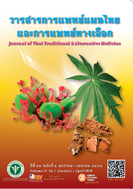Quality of Working Life of Thai Traditional Medicine Assistants, in Thai Traditional and Integrated Medicine Hospital under the Department of Thai Traditional and Alternative Medicine, Ministry of Public Health
Main Article Content
Abstract
The purpose of this cross-sectional study was to examine the Quality of Work Life (QOWL) and related factors among Thai traditional medicine assistants in Thai Traditional and Integrated Medicine Hospital. The samples were 63 Thai traditional medicine assistants (TTMA). Data collection was done through interviewing, a questionnaire and focus groups. The data were analyzed by using descriptive statistics and summary of the focus group discussion information. Almost 60% of the subjects were females with an average age of 43. Their average income was 19,000 baht per month and over 46.03% were between 20,001 and 26,000 baht. The findings revealed that the percentage-mean score of overall QOWL was 66.65% regarded as moderate level. Percentage-mean score in the commitment to the organization was highest while the control at work aspect was lowest. It was found that TTMA had health problems, neck muscle pain, shoulder pain, and lower back pain. More than 90% rely on medical care welfare from their gold card scheme. The study’s findings lead to recommendations that administrators should have a policy of setting a break time for Thai traditional medicine assistants about 5–10 minutes between patients so that they can relax and reduce their chances of suffering muscle spasms. Furthermore, Thai traditional medicine assistants should be involved in the organization’s process of decision-making on issues related to them which will improve their quality of working life.
Article Details
References
2. Health Data Center. Health Data Center report of OPD-massage and herb steam service (on and off-site services) fiscal year 2015–2017: Information and Communication Technology Centre, Office of Permanent Secretary, the Royal Thai Ministry of Public Health. [Internet]. 2017 [cited 2017 Oct 19]; Available from: https://hdcservice.moph.go.th/hdc. (in Thai)
3. Easton S, Van LD. User Manual for the work-related quality of Life (WRQoL) scale: a measure of quality of working life. 2nd ed. Portsmouth: University of Portsmouth; 2018. 200 p.
4. Beasley JW, Karsh B-T, Hagenauer ME, Marcband L, Sainfort F. Quality of work life of independent vs. employed family physicians in Wisconsin: a WReN study. Annals of family medicine. 2005;3:500-6.
5. Opollo JG, Gray J, Spies LA. Work-related quality of life of Ugandan healthcare workers. Int Nurs Rev. 2014:61(1):116-23.
6. Maungsan S, Tridech P, Pandii W. Quality of working life of professional nurses in faculty of medicine Vajira hospital, university of Bangkok metropolis. Vajira Nursing Journal. 2012;14(1):73-85. (in Thai)
7. Thipvatee T, Mulasart S, Keawpan W. Factors predicting work-life balance of registered nurses at the tertiary hospital: a case study of Bhumibol Adulyadej hospital. Journal of the Royal Thai Army Nurses. 2017;18(Supplement):S198-206. (in Thai)
8. Sakunee S, Tridech P, Siri S, Tridech S. The relationship between organization commitment and quality of work life of Sakaeo Crown Prince Hospital’s personnels. The Journal of Prapokklao Hospital Clinical Medical Education Center. 2015;32(2):108-25. (in Thai)
9. Thonglek S, Wanna S. The quality of work life of hospital epidemiology in health district, Sakaeo Province. KKU Journal for Public Health Research. 2013;6(2):100-8. (in Thai)
10. Erb-Im B. Job stress among spa therapists in Phuket province. (M.P.H. Thesis in Public Health) Faculty of Graduate Studies. Bangkok: Mahidol University; 2015. (in Thai)
11. Tajama B, Kongsin S, Torugsa S, Harncharoen K. Factors effected to the quality of work life among staff at Bumrungrad international hospital. Journal of Public Health 2012;42(2):82-91. (in Thai)
12. Promeiang P, Suwannapong N, Thipayamongkolkul M, Boonshuya C. Quality of work life among professional nurses in Nakhonpathom hospital. Journal of Health Science. 2015;24(3):769-78. (in Thai)
13. Bejrsuwana A, Suwannapong N, Howteerakul N, Boonshuya C. Nurse’ quality of work life in private hospital. Kuakarun Journal of Nursing. 2012;19(2):103-17. (in Thai)
14. Sirisawasd P, Chaiear N, Johns NP, and Khiewyoo J. Validation of the Thai version of a work-related quality of life scale in the nursing profession. Safety and Health at Work. 2014;5(2):80-5 (in Thai)
15. Sadakorn T. Quality of life of Thai massagers in Bangkok and Nonthaburi Province. Thailand. Journal of Health Promotion and Environmental Health. 2009;32(2):91-102. (in Thai)
16. Chuatrakul T. The labor process and hospital porters' stress in a regional hospital. (M.A. Thesis in Medical and Health Social Sciences) Faculty of Graduate Studies. Bangkok: Mahidol University. 2009. (in Thai)

